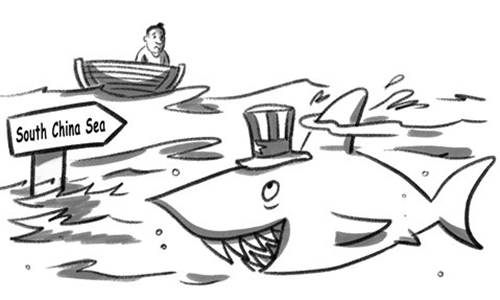Pompeo’s S.China Sea declaration risks pushing China-US ties into abyss
By Ju Hailong Source: Global Times Published: 2020/7/21 14:40:01

Illustration: Liu Rui/GT
On July 13, US State Secretary Mike Pompeo issued a public press statement entitled "US Position on Maritime Claims in the South China Sea."Although there is nothing new in the content of this sort of message, the statement inevitably caused panicked speculation - because it was issued by the US secretary of state at a time when the relations between Beijing and Washington plummeted. It calls into question the security and stability in the South China Sea region as well as the prospect for China-US relations and the international order. Pompeo's statement is riddled with questionable strategic and tactical claims.
At the tactical level, it continues the US' practice of leading international public opinion: setting up a universal value benchmark and smearing its rivals with various "evidence," including false, deceptive, and distorted "proofs."
Generally, US strategy against China won't allow Washington's absolute predominance in the current world order to be changed by China's rise. Therefore, the US has been close to a strategic point of no return with a number of tactical pressures it has placed on China.
Pompeo's statement is once again using "salami tactics" around the strategic line between China and the US.
This is a new bet on the China-US relations by US political elites. They are confident enough that China will not overreact and dare not start a showdown. They believe that such tactics with limited pressure will make China angry, oppressed, and reveal its bottom line more clearly, without destroying the rationality of Chinese policymakers.
This public statement maliciously creates a dark image of China's alleged intentions to dominate the world and threaten the South China Sea. It casts a false picture that China is a bully threatening regional as well as world peace.
Pompeo is a politician who openly preaches lies and conspiracies. He is good at playing these political tricks. This, sadly, could push China-US relations into even more terrible situation. Given the complexity of China-US relations and information asymmetry between the two countries, the possibility of strategic misjudgments will increase. This could ignite powder-kegs. History has proven more than once that this sort of tragedy arises from such strategic misjudgment.
Whether there will be a war or not depends on the two countries themselves. If China and the US break up, neighboring countries in the South China Sea will be the first to be overwhelmed. Neutrality will no longer be these countries' firewall. But if they chose one side or the other, they will suffer severely. Pompeo's statement shows that the US policy in the South China Sea has changed from military pressure into a comprehensive suppression combining military action and hyping public opinion. This is an escalation of the US' tactical pressure on China, and especially on the South China Sea issue.
By resuming such a high-stake public opinion war, the US has at least three goals. First, the US wants to constrain the pace of the Code of Conduct negotiations and make it more in line with the US interests. Second, the US wants to disperse the pressure for US arms sales to the island of Taiwan and suppress the possibility of the Chinese mainland's reunification with military means with the island. Third, the US wants to set up a strategic pawn for the next administration to reshape the Asia-Pacific region and to deal with China.
Pompeo's statement is a weather vane of the US' overall Asia-Pacific strategy and strategy toward China. To maximize the effect of counterattacks, China's measures should be incorporated accordingly into its overall Asia-Pacific strategy and its strategy toward the US. These must be based on China's expectations on the Asia-Pacific order and China-US relations in the next one or two decades.
In this way, China's tactical choices will lead to neither arrogance nor fears of misfires. Once China has this strategic system established, the South China Sea issue will be transformed from the game field for China-US relations into a channel for the transmission of strategic information between the two countries. Even if a small armed conflict does break out, it will turn into a tactical opportunity to adjust or improve China-US ties.
The author is senior professor of the School of International Studies, Jinan University in Guangzhou. opinion@globaltimes.com.cn
Posted in: ASIAN REVIEW,SOUTH CHINA SEA FOCUS